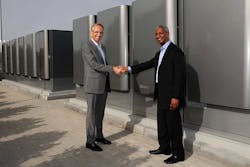Bloom Energy touts Ferrari deal for Fuel-Cell onsite power plant
Fuel-cell technology firm Bloom Energy’s entry into the European market offers an historic first for the company and a momentum sparking nod to the future for decarbonizing industries.
High performance automaker Ferrari announced it will install Bloom Energy’s solid oxide fuel cell at its manufacturing and headquarter site in Maranello, Italy. The 1-MW fuel cell, called a Bloom Server, utilizes non-combusting oxidation of natural gas to create electricity.
The Bloom technology initially will generate about five percent of Ferrari’s energy needs at Maranello. But it promises to greatly reduce carbon emissions and eliminate nitrogen oxide emissions compared with the natural gas-fired turbine generation it is replacing, according to Bloom Energy.
“We think it’s a first step,” Tim Schweikert, Bloom Energy’s senior managing director, international business development, told EnergyTech in an exclusive interview. “It replaces that gas-fired turbine, with the difference being the output is still electricity but you’re not combusting natural gas.”
Ferrari’s goal, like many European companies, is to reach Net-Zero in greenhouse gas emissions within the coming decades. The Italian automaker also plans to shift its fleet toward battery electric vehicles.
This is Bloom Energy’s first real project in the European market. The San Jose-Calif.-based company has been making and installing fuel cell plants across the U.S. for more than a decade.
Fuel-cell technology also can involve hydrogen, which does not emit any carbon when generating electricity. Hydrogen, however, must be created via steam reforming of methane gas, which necessitates some carbon intensity, or electrolysis separating the H2 from water via an electrochemical process.
Europe is only starting to pivot away from natural gas since Russa’s invasion of Ukraine. Russia has supplied high percentages of the gas consumed in Europe, but reaction to the war may change that in the short term.
“Our fuel cell technology is not real well known in Europe,” Schweikert pointed out. “The way we look at it we think we are positioned really well as an enabler to accelerate the transition toward net zero. Energy security and lowering emissions are top of mind there.”
Another challenge in Europe, since its is decreasing coal and nuclear generation capacity, is actually meeting the demand of both energy customers and those new industries and resources wanting to get connected to the grid.
“We’re talking to a number of customers getting turned away from the grid,” Schweikert told EnergyTech. In one case a customer wants to open a large data center in Dublin. “They are told they are not able to get on the grid for five to seven years. Either the capacity or distribution grid cannot handle them.”
On-site power generation is a clear answer for the C&I sector. In Ferrari’s case, the automaker to bolstering its energy resiliency while also reducing carbon emissions about 20 percent compared to the combined heat and power system currently in operation.
“Ferrari is working harder than ever to achieve carbon neutrality by 2030, through the adoption of leading-edge technologies and of a scientific approach that are written in our DNA,” Benedetto Vigna, Ferrari CEO, said in a statement. “We are thrilled to partner with Bloom Energy, as both our Companies are highly committed to a decarbonization path, and proud to host its first European installation.”
Europe is building out an emerging hydrogen energy economy, as well. Bloom Energy leaders say they can incorporate a blend of up to 50 percent hydrogen in the fuel cell technology and eventually grow that.
Italy has vowed to gain a fifth of its energy from hydrogen by 2050.
Founder Enzino Ferrari’s startup built its first car in 1940. Ferrari is the oldest and most successful automaker in the Formula One facing series.
-- -- --
(Rod Walton, senior editor for EnergyTech, is a 14-year veteran of covering the energy industry both as a newspaper and trade journalist. He can be reached at [email protected]).
About the Author
Rod Walton, EnergyTech Managing Editor
Managing Editor
For EnergyTech editorial inquiries, please contact Managing Editor Rod Walton at [email protected].
Rod Walton has spent 17 years covering the energy industry as a newspaper and trade journalist. He formerly was energy writer and business editor at the Tulsa World. Later, he spent six years covering the electricity power sector for Pennwell and Clarion Events. He joined Endeavor and EnergyTech in November 2021.
Walton earned his Bachelors degree in journalism from the University of Oklahoma. His career stops include the Moore American, Bartlesville Examiner-Enterprise, Wagoner Tribune and Tulsa World.
EnergyTech is focused on the mission critical and large-scale energy users and their sustainability and resiliency goals. These include the commercial and industrial sectors, as well as the military, universities, data centers and microgrids. The C&I sectors together account for close to 30 percent of greenhouse gas emissions in the U.S.
He was named Managing Editor for Microgrid Knowledge and EnergyTech starting July 1, 2023
Many large-scale energy users such as Fortune 500 companies, and mission-critical users such as military bases, universities, healthcare facilities, public safety and data centers, shifting their energy priorities to reach net-zero carbon goals within the coming decades. These include plans for renewable energy power purchase agreements, but also on-site resiliency projects such as microgrids, combined heat and power, rooftop solar, energy storage, digitalization and building efficiency upgrades.

